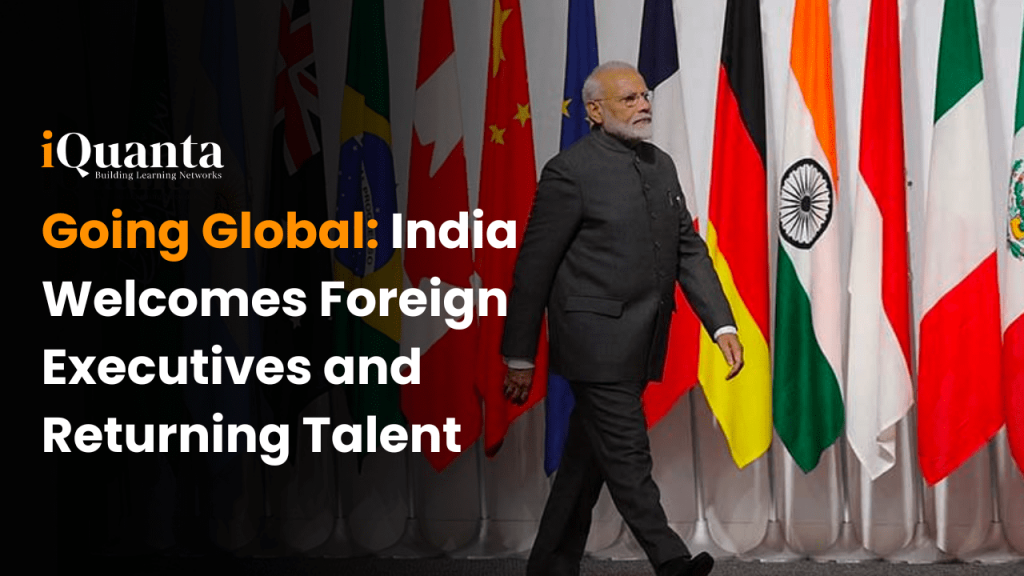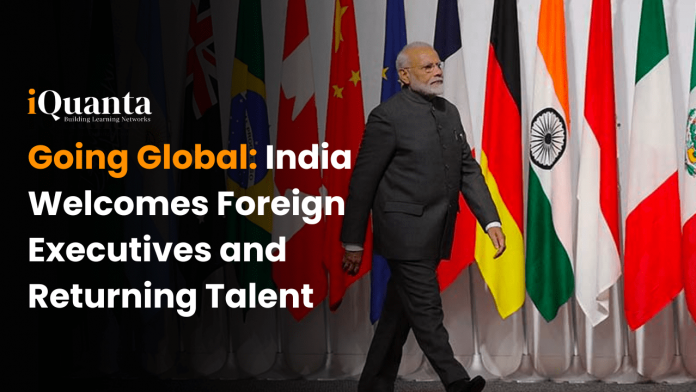
Genre : Business & Economy
The employment practices of Indian corporations have seen a radical change in the last few years, as businesses increasingly look to foreign leaders and Indians with international expertise to support their expansion goals. The aforementioned trend is driven by multiple variables, such as digital transformation, worldwide expansion, and talent gaps. It underscores India’s increasing global prominence and its dedication to competing on an international level.
Organizations are utilizing the global talent pool in a variety of areas, from conglomerates like the Adani Group to oil and gas giants like Vedanta. This phenomenon is drawing Indian expats back home, who are keen to contribute to the enthusiasm and promise that India provides, along with changing the leadership dynamics of Indian enterprises.

Driving Factors for the Influx of Global Talent
- India’s Growth Story
One of the world’s economies with the fastest rate of growth is India, which attracts ambitious workers looking for exciting employment opportunities and career challenges. The economic momentum of the nation is drawing in talent from around the world who are eager to support India’s upward trajectory. - Skill Shortages
Some industries undergoing rapid expansion, like electronics manufacturing and the green hydrogen production, are facing a scarcity of competent local workforce. As a result, to find the talent they need to drive innovation in these vital fields, businesses are forced to search beyond national boundaries. - The Switch to Digital
The continuous digitization of various businesses necessitates specialized knowledge that may not be easily accessible within the domestic labour pool. Global executives with experience in cutting-edge technologies like artificial intelligence and data analytics have become indispensable assets for companies navigating the complexities of digital domains. - International Ambitions
Companies aspiring to go global recognize the need for leaders who understand diverse markets and possess the cultural agility to navigate them. Hiring executives with international experience strengthens the global outlook of Indian companies and enhances their ability to compete on a worldwide scale.
Examples of Global Hirings
Several prominent Indian companies have embraced this trend by appointing foreign executives to key leadership positions:
- Adani Ports- The Adani Group appointed Ashwani Gupta, former COO of Nissan Motors, as its CEO, aligning with the group’s focus on international expansion and leveraging global expertise to drive growth.
- Kotak Mahindra Bank – Kotak Mahindra Bank welcomed Ashok Vaswani, ex-President of Pagaya, and Anupam Kaura from Crisil London, demonstrating the bank’s commitment to tech-driven transformation and its efforts to attract top talent globally.
- Vedanta – Vedanta onboarded 30 expatriates in crucial functional areas like exploration and mining, showcasing the company’s focus on acquiring specialized skills and enhancing its production capabilities.
Challenges and Considerations
Unquestionably, the inflow of international talent has advantages, yet this change is not without difficulties and considerations:
- Integration and Cultural Fit – Successful global hiring programs depend on facilitating foreign executives’ seamless absorption into the Indian workplace and promoting intercultural understanding. Businesses need to foster an environment at work that values and respects a range of viewpoints and experiences.
- Compensation and Retention – It can be expensive for businesses to provide top people attractive compensation and rewards in order to attract and retain them. Striking the right balance between compensation and long-term value creation is imperative for sustainable growth. The optimal mix of human capital and human efficiency is the key for organisation to thrive and survive in an ever-competitive business invitation.
- Focus on Local Development – Companies need to make investments in upskilling and developing local personnel in addition to leveraging global expertise. Long-term, this strategy contributes to closing the talent gap and guarantees an inclusive, sustainable growth model.
The Future of Global Hiring in India
The trend of hiring international executives and luring in Indian talent is expected to pick up steam as India’s economy grows and its ambitions to become a major player in the world economy become more apparent. But companies need to be strategic and thoughtful, finding a fine balance between local employees’ growth and empowerment and the need for international experience.
Indian firms should concentrate on creating an open and diverse work environment that draws on the best elements of both Indian and global communities in order to fully take advantage of this dynamic talent pool. By doing this, they can make a lasting and significant contribution to their route to global leadership in addition to satisfying their urgent talent needs. As India continues to shape its future on the global stage, the integration of diverse perspectives and experiences will undoubtedly play a pivotal role in driving innovation and growth.

